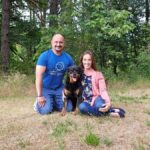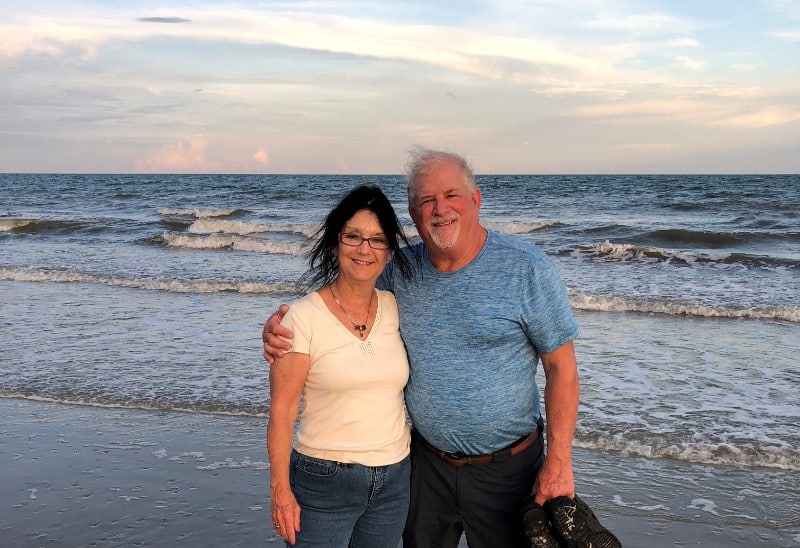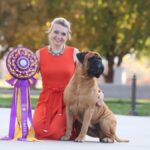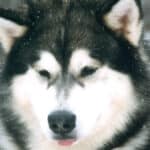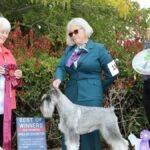Interview with Scott and Kathy Shifflett, Breeders of Kurly Kreek Curly-Coated Retrievers
Where do we live? How many years in dogs? How many years as breeders?
Kathy Shifflett: We live in Tracys Landing, Maryland. Scott and I have had dogs our entire lives along with many other animals. We acquired our first Curly-Coated Retriever (CCR) in 1993 and bred our first litter in 1997. Therefore, we have been breeding CCRs for 26 years.
What is our kennel name? How many dogs do we currently keep?
Kathy Shifflett: Our kennel name is Kurly Kreek.
Which show dogs from the past have been our noteworthy winners?
Kathy Shifflett: BIS BISS GCHG Kurly Kreek Hudson’s Mayhem CGC is a most notable dog from our kennel. “Hudson” is among the 11 CCRs to have had the Best in Show honor bestowed upon him. Hudson had a stellar career. He was awarded Winners Dog and Best of Winners at the 2011 CCRCA National Specialty and then, in 2018 at the age of 11, he was awarded Best of Breed at the CCRCA National Specialty. At every specialty that Hudson attended he received an award.
Another notable dog was BIS CH Kurly Kreek Marshal Dillion Boyerie WC. We are fortunate to have bred two of the 11 CCRs that have been awarded Best in Show. Another dog that is notable to our kennel is GCHG Kurly Kreek Copperhead Road DN DJ WC (Boo). Hudson and Boo were All-Systems Breed winners for six years in a row. Hudson and Boo were also the recipient of the CCRCA Ann Brenner Memorial Trophy (Top Show Dog) for six years running.
Which have been our most influential sires and dams?
Kathy Shifflett: CH Addidas Such Charm CGC ROM (CeCE) was our foundation bitch. Her DNA is stamped on the three dogs listed above as well as some of our young dogs. She was the producer of BIS CH Kurly Kreek Marshal Dillon Boyerie’s WC.
An offspring of CeCe’s, CH Kurly Kreek Rosie the Riveter, was also a great producer for us.
Can we talk a bit about our facilities? Where are our puppies whelped? How are they raised?
Kathy Shifflett: We have a kennel to house the dogs. However, our puppies are whelped in our home in a separate area. They are handled every day, weight checked, and general health monitored. As they age, they begin to go through puppy testing along with solving puzzles. We test each puppy individually using the Puppy Attitude Test. The CCR puppy is very smart, and they learn very quickly. One of their most favorite play items is the agility tunnel. Even though they run through the tunnel, they learn very quickly that it is also a great hideout for sleeping.
What is our “process” for selecting Show Puppies? Performance Puppies? Field Puppies?
Kathy Shifflett: When we breed a litter, we are looking for the “wow” puppy that has the potential to excel in all aspects of what a CCR can do. A Curly-Coated Retriever is a multi-purpose dog. These dogs can be great Conformation Dogs (of course, always looking for breeding stock), great Companion Dogs, and great Performance Dogs (Field, Obedience, Rally, Dock Diving, Lure Coursing Fast CAT, Barn Hunt, etc.). But most of all, these dogs are our friends. For field dogs with drive, we work with the puppies using wings and baby bumpers to see if they have the desire to pick up the wings or bumpers. Most of them do.
When evaluating for conformation, we evaluate the puppies at seven weeks. However, we are eagerly watching the puppies daily and note their interactions with the other puppies and with us.
- We look at the total puppy and evaluate it against the CCR Breed Standard.
- We look at shoulder layback, length of body, topline, strong hind quarters, tail set, etc.
- We watch them move freely. We look for independence and confidence.
- We often have a fellow breeder/mentor evaluate the litter first-hand and compare notes.
Often, we fully agree on the rankings. On those aspects where we don’t agree, we discuss. This is a way for both of us to continue to learn.
Do we compete in Companion Events? Performance Events?
Kathy Shifflett: We do compete in Companion Events (CGC, CGCA, Urban Dog, etc.). We are also competing in Obedience and Rally Events, Dock Diving, Fast CAT, and Lure Coursing.
Are Field Trials or parent club Hunt Tests important to us?
Kathy Shifflett: We have not competed in AKC Field Trials. However, these events are extremely important to our breed. We do compete in the CCRCA Working Certificate Test. Almost every year, the CCRCA hosts Curlyville. Curlyville is a great place for beginners to go and learn about field work and training. The event culminates in the running of the CCRCA Field Test, Working Certificate, Working Certificate Qualifier, and Working Certificate Excellent. Usually, after two days of training, if a Curly-Coated Retriever comes in with little or no training they will pass the WC because of their natural abilities. (In my case, it surely isn’t the handler.) We have wonderful trainers to help both human and dog have a wonderful, positive experience.
How would I define “conditioning” as it relates to our breed?
Kathy Shifflett: Conditioning depends on the discipline for which you are training. However, the first and foremost aspect of training is to have the dog physically and mentally fit for the job we are asking them to do. A lot of this conditioning may be performed in an open environment. However, if you are on the road with your dogs and competing in Conformation, a lot of the conditioning is performed by road work either with a golf cart or a bicycle.
If you are training for Performance Events, your conditioning is much different. Of course, your dog must be physically fit, but your dog must also be conditioned, and learn commands and how to perform those commands. This work is typically done with positive reinforcement when the command is performed, and this reinforcement will change as the level of difficulty increases. For Performance, a lot of the conditioning is done with Classical Conditioning.
Are there any health-related concerns in our breed? Any special nutritional needs?
Kathy Shifflett: The CCRCA has published a list of breed-specific testing that is required by breeders to be on the CCRCA’s Breeders List. There are three autoimmune tests which are required for the CCR, Glycogen Storage Disease (GSD), EIC (Exercise Induced Collapse), and Progressive Retinal Atrophy (PRA). Even though there aren’t specific genetic CCR markers, these tests are performed against other Sporting Dog markers. We test all of our breeding stock for heart disease, hips, and eyes. Unfortunately, there isn’t the perfect dog.
Do we think our breed is supported by a sufficient number of preservation breeders?
Kathy Shifflett: Preservation is defined as the “act or process of keeping something valued alive, intact, or free from damage or decay.” As a preservation breeder, we are maintaining the original purpose of the CCR, a retrieving gundog on land and in water, as well as maintaining the Breed Standard as set forth by the parent club.
In my opinion, a CCR puppy isn’t for everyone. We screen all applicants for a puppy. As breeders, we are doing our best to breed healthy dogs that meet the Breed Standard as well as the purpose of the breed. As a preservation breeder, we are the stewards of the breed, and we are entrusted to maintain the CCRCA Breed Standard and the purpose of this wonderful water and land retriever. It is our job to ensure the CCR continues to maintain its dual purpose in the Sporting Dog world. In our 26 years of breeding, we normally only breed one litter a year and that is when we are looking for something to keep for ourselves. We do not breed a litter simply because we have a waiting list.
Is our breed well suited to be a family dog? Who are the best candidates to own our breed?
Kathy Shifflett: A CCR puppy is well suited for a family dog, if the buyers remember that they are the alpha in the family and not the puppy. We highly encourage all puppy buyers to find some form of puppy kindergarten and basic obedience training as soon as possible. This helps the puppy to create a bond with the person. A CCR puppy can be high energy and will require sufficient exercise throughout the day. Families that are active are the best homes for a CCR puppy. The CCR puppy excels at keeping you busy and on your toes.
What is the biggest misconception about our breed? What is our breed’s best-kept secret?
Kathy Shifflett: One of the biggest misconceptions is that a Curly-Coated Retriever is for everyone who wants one. This isn’t the case. The breed’s best-kept secret is their mere existence. For the most part, the public thinks they are some kind of Doodle. Public Education is the best thing for this breed. Even when you tell some people it is a purebred dog, they still walk away with the “Doodle thought.” It is very disconcerting; however, we cannot educate everyone.
If we could share a comment or two with judges of our breed, what would we like to say to them?
Kathy Shifflett: For the judges, they need to look at the dog’s structure and know the Breed Standard. A dog with a tight, crisp curl is highly desirable since the coat is the hallmark of the breed. Patterning of any kind, down the neck or down the hind legs, or missing coat on any part of the body on that day should be penalized. It appears some judges have a high desire to only use the Black CCR and oftentimes overlook a wonderful breed specimen if it is Liver. Both colors are acceptable and the Liver dog, because of color, should not be overlooked. It seems, over time, that we are getting over this barrier of coat color. Regardless of color, the structure is the same. Many times, a GREAT CCR is overlooked in the Sporting Group because judges don’t see them every week.
Do we have any words of wisdom to pass along to newer breeders?
Kathy Shifflett: For new breeders, they MUST find a mentor and learn from the mentor. For us, this has resulted in a lifelong friendship. It is fine to ask questions and to have disagreements, but one needs to look at learned knowledge.
Unfortunately, for our breed over the past few years, we have lost a lot of knowledge in those who have passed. Also, it is like how most things go today; the newer generation knows everything and doesn’t seek the advice of the “old guard.” We are entrusting a new generation of breeders to preserve the breed according to the approved AKC Breed Standard.
For a bit of fun, what’s the most amusing thing we’ve ever experienced with a Sporting Dog?
Kathy Shifflett: Every day, a Curly-Coated Retriever will do something that amuses me. They are mischievous and are always willing to put a smile on your face with something silly they do.
Are you looking for a Curly-Coated Retriever puppy?
The best way to ensure a long and happy relationship with a purebred dog is to purchase one from a responsible breeder. Not sure where to begin finding a breeder?
Contact the National Parent Club’s Breeder Referral person, which you can find on the AKC Breeder Referral Contacts page.
Want to help rescue and re-home a Curly-Coated Retriever dog?
Did you know nearly every recognized AKC purebred has a dedicated rescue group? Find your new best friend on the AKC Rescue Network Listing.
Curly-Coated Retriever Breed Magazine
Showsight Magazine is the only publication to offer dedicated Digital Breed Magazines for ALL recognized AKC Breeds.
Read and learn more about the intelligent Curly-Coated Retriever dog breed with articles and information in our Curly-Coated Retriever Breed Magazine.
Error embedding FlippingBook shortcode, please check the flipbook url. (https://digital.showsightmagazine.com/view/989590/)
If you enjoy the Curly-Coated Retriever Breed Magazine, help us educate the community by sharing it.
